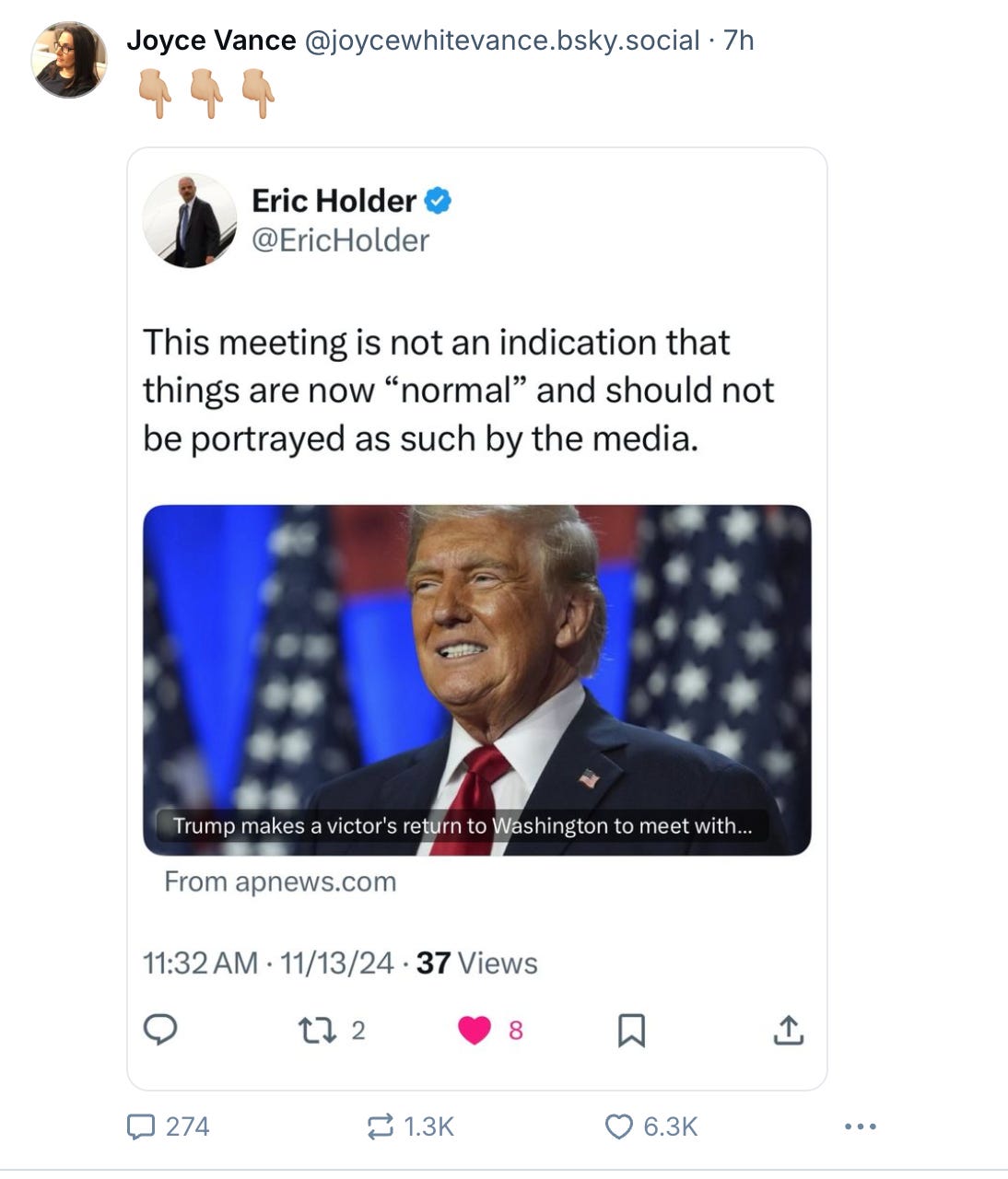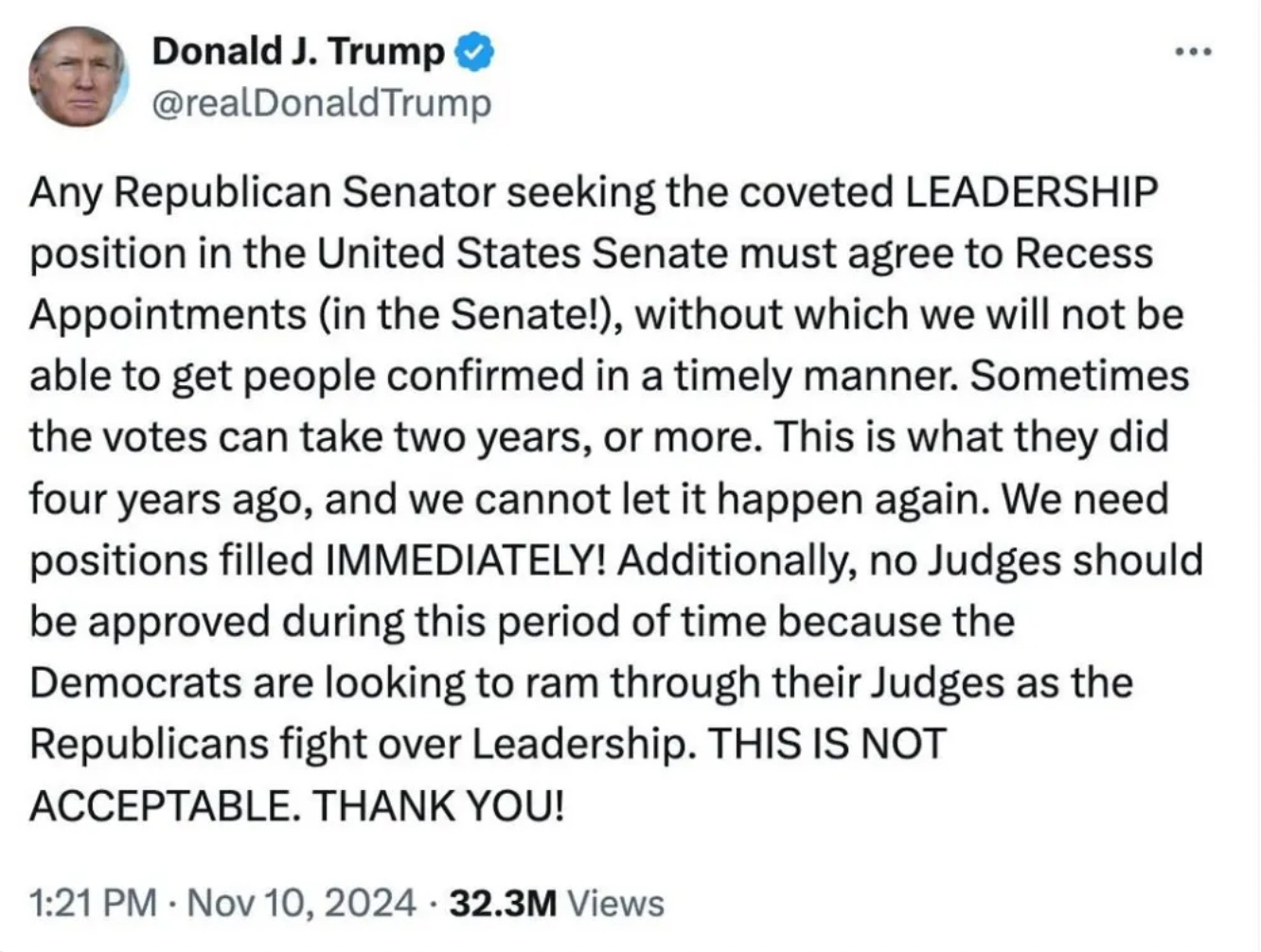This morning, my former boss, Eric Holder, posted this after networks aired a brief clip of the surreal meeting at the White House between President Biden and Donald Trump.
He was right. Things promptly went downhill as Trump added more people to his previously announced list of appointed officals to helm his new administration. They ranged from nonserious, like the Russia-friendly Tulsi Gabbard for Director of National Intelligence, to the outrageous, like Matt Gaetz for Attorney General. They seem designed to provoke outrage and get Democrats spun up. But there’s something more to them than that. They’re also a test for the Senate. A test of whether the Senate will be loyal to the Constitution or whether it will bend the knee to Donald Trump.
Alaska Republican Senator Lisa Murkowski said Matt Gaetz wasn’t a “serious candidate,” while Alabama Senator “Coach” Tommy Tuberville said that Trump was elected by an “enormous vote” (he wasn’t) and he “deserves” to have the “team” around him that he wants. But that’s not how it works. Tuberville, who during his campaign didn’t know what the three branches of government or the Voting Rights Act were, still doesn’t understand how the Constitution works. He apparently doesn’t know that presidents must have the advice and consent of the Senate for the team they select.
Under the Constitution, there are some decisions presidents can only make “with the Advice and Consent of the Senate,” including the appointment of cabinet secretaries and other senior executive branch officials. Article II, Section 2, Clause 2 of the Constitution provides that:
[The President] shall have Power, by and with the Advice and Consent of the Senate, to make Treaties, provided two thirds of the Senators present concur; and he shall nominate, and by and with the Advice and Consent of the Senate, shall appoint Ambassadors, other public Ministers and Consuls, Judges of the Supreme Court, and all other Officers of the United States, whose Appointments are not herein otherwise provided for, and which shall be established by Law: but the Congress may by Law vest the Appointment of such inferior Officers, as they think proper, in the President alone, in the Courts of Law, or in the Heads of Departments.
That means senators have a serious duty to fulfill in this regard. Although it is not common, they can reject a pick made by the leader of their own party when enough of them join with the other party. In other cases, Senate scrutiny leads candidates to withdraw their names when a nomination lacks the votes for confirmation. In 2018, Donald Trump nominated Ronny Jackson, his physician, to be Secretary of Veterans Affairs. Jackson subsequently withdrew himself from consideration after senators expressed skepticism of the nomination due to Jackson's lack of management experience and allegations surfaced that he allowed a hostile work environment to exist and “behaved improperly” in the White House medical unit he ran.
The advice and consent provision was decided upon by the Founding Fathers as the best method to strike a balance between “government by cabal” if officials were selected solely by senators who were subject to influence of their most powerful constituents and the power of “monarchies” if presidents were free to choose without constraint. In April of 2014, midway through President Obama’s second term, Republican Senator Orrin Hatch wrote in The Hill, “The Senate’s constitutional role of ‘advice and consent’ is an essential check on the president’s constitutional power to appoint executive and judicial branch officials.”
Apparently, that’s no longer the case.
Just five days after the election and with a healthy majority in the Senate, which will stand at 53-47 with a Republican majority, Trump demanded Republican allegiance for recess appointments. That doesn’t make a lot of sense at first blush. The recess appointment provision found in Article II, Section 2, Clause 3 of the Constitution gives the president the “Power to fill up all Vacancies that may happen during the Recess of the Senate, by granting Commissions which shall expire at the End of their next Session.” It’s a stopgap measure. But it has been used in some cases to get nominees who didn’t have the votes into office, as George W. Bush used it for a judicial nominee. With the kind of Senate margin Trump has, there should be no need for recess appointments.
Why would Trump need to make recess appointments with these majorities? Why would he demand that senators abandon their Constitutional obligation to engage in advice and consent? Why would he make laughable nominations like Gabbard and Gaetz? He’s doing it to force the Senate to bend the knee, immediately upon his inauguration. Loyalty to Trump, not the Constitution, will be the order of the day, and he’s making it known and demanding immediate obedience.
Elon Musk replied to Trump’s tweet, “This is essential. There is no other way.”
Even Trump’s reasoning here is wrong. Recess appointments aren’t essential to getting “people confirmed in a timely manner.” Nor are his claims it takes years accurate. The highly regarded, bipartisan, Center for Presidential Transition reports that most of a president’s initial picks for cabinet secretaries are quickly confirmed. “While Trump’s nominees took an average of nearly 24 days each to confirm, his experience was the exception rather than the rule. Because of the transition’s leadership changes [Trump fired Chris Christie and started over shortly after his election] immediately following the election, the Trump transition had a late start selecting and vetting candidates. This late start, combined with paperwork delays for nominees and the fact that a number of nominees had particularly complicated financial portfolios, added days to the confirmation process. Some of Trump’s nominees faced additional procedural votes to advance their nominations, due to a lack of bipartisan support. Even with those problems, 14 of the 15 secretaries Trump officially submitted to the Senate were eventually confirmed.”
To the extent that Trump’s choices weren’t confirmed as quickly as his predecessors, it was due to self-inflicted wounds, and even then, most of his initial picks were confirmed by February 2017. It did not take years.
So, Trump is sending an early message to the Senate about what he expects from them: total fealty, total loyalty. Bend the knee, lest they end up like Nikki Haley or Mike Pompeo, out of the fold.
It would be childish in any other context, but here, we have the next president, squarely telling senators that they must abandon the Constitution and give him their loyalty if they want to hold on to power.
How bad is it going to be? Perhaps there will be a few brave senators who will take a stand on a nomination or two. But no one stays opposed to Trump and sticks around for long. The new Republican Senate leader, South Dakotan John Thune, voted to acquit Trump following the second impeachment trial, but said "My vote to acquit should not be viewed as exoneration ... What former President Trump did to undermine faith in our election system and disrupt the peaceful transfer of power is inexcusable.”
Unless something changes, Senate Republicans are unlikely to stand up to Donald Trump as the Constitution obligates them to do. They will have to choose whether to do the right thing or be complicit in Trump’s malfeasance. No serious president would suggest that a TV pundit with no experience running a major executive branch agency could run the Department of Defense. But Donald Trump has. This is exactly why the Founding Fathers gave the Senate the responsibility for advice and consent. If they abdicate, the can never again claim to be constitutionalists.
We’re in this together,
Joyce









Joyce, I have serious concerns for the future of the United States.
Does MAGA think this is a joke?
I'm listening to podcasts re how Dems didn't message correctly to struggling people, that we're elitists, while Trump's shadow prez is the richest man on earth, while they offer up Matt Gaetz as AG and a Fox News host as Secretary of Defense.
Maybe "elite" is synonymous with "competent" and "reality-based."
Sigh. But I do appreciate you, Joyce Vance.